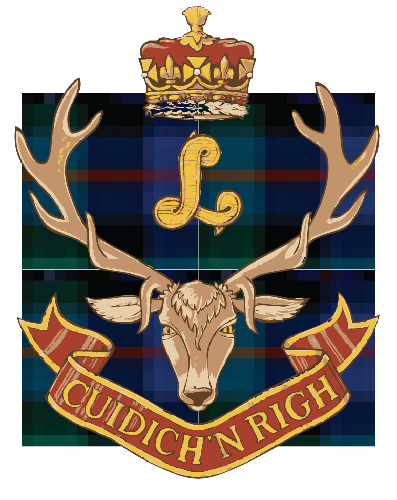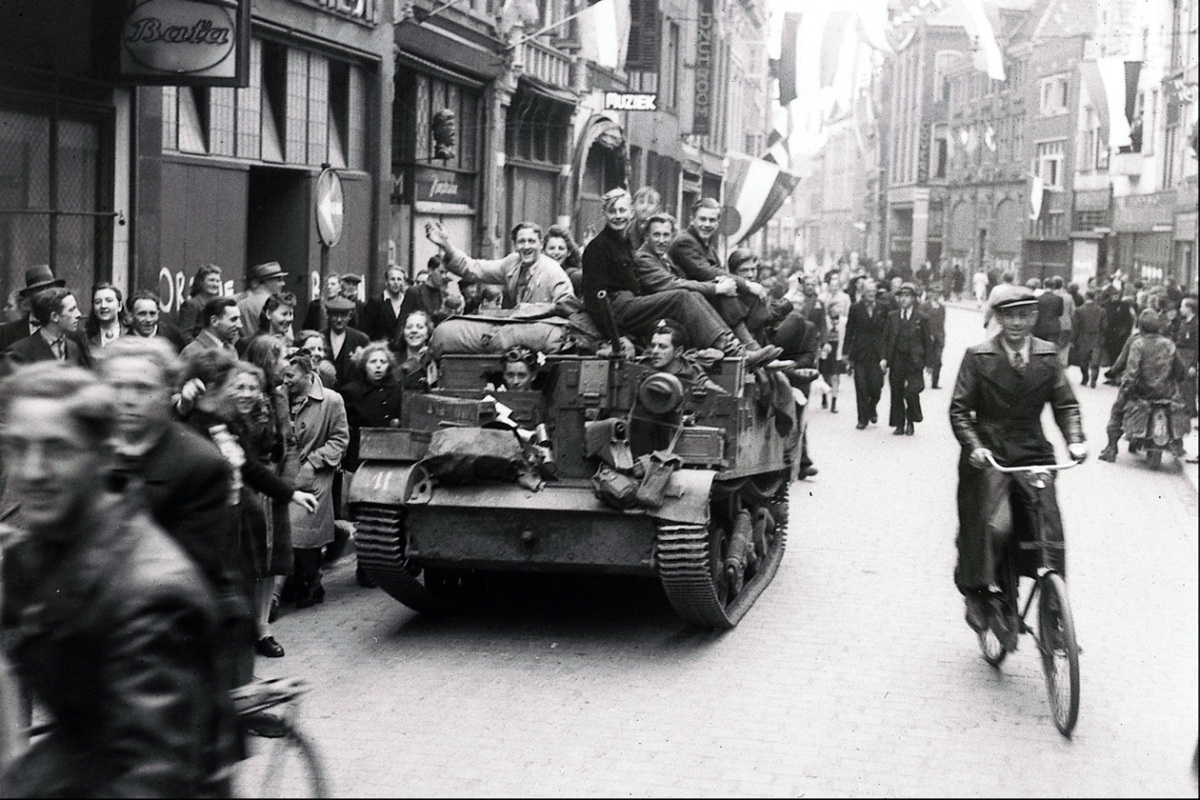The Soldier and the Young Woman
Many years ago, all of Europe was engulfed in a terrible war. The small country of Holland was occupied by the enemy for five long years and life became very difficult for the inhabitants. Food was scarce, winters were cold and there was the constant danger of being arrested for the smallest thing. Everybody was hungry, cold and scared. In the city of Amsterdam, there was a family, who, before the war, had lived a very comfortable life. The father was a well known lawyer, the mother was friends with the queen, the two sons were well on their way to becoming successful in their fields and the daughter led a happy life full of social, artistic and sporting activities. The war changed everything. The father had to go into hiding because the enemy was searching for him; the two sons went underground to join the resistance and were constantly on the run; and the mother and daughter were left on their own, except for rare moments when the father dared to come out of hiding. But those moments were few and far between because their house was constantly under surveillance. The mother and her daughter basically had to fend for themselves during the whole war, surviving persecution and famine. But in the spring of 1945, the war appeared to be coming to an end. The allied troops were gaining ground every day and soon, the Seaforth Highlanders, a Scottish regiment based in Vancouver, entered into Holland and received orders to march in the direction of Amsterdam in order to liberate the inhabitants from the clutches of the war. On the 7th of May, 1945, the rumour spread that the war was over. The daughter, along with several friends rushed to the center of the city of Amsterdam to celebrate with hundreds of other jubilant inhabitants, only to be met by machine gun fire coming from a few last enemy combatants. Many people were killed, but the daughter and her friends were saved by a shopkeeper who pulled them inside and hid them in his basement. Near the end of the day, they finally left the store and made it safely back home.
The next day, May the 8th, the Seaforth Highlanders marched into Amsterdam, and now there was no doubt that the war was over. They set up camp in the large park just behind the house of the daughter and her family. They were ecstatic. Free at last. This day became known as the liberation.
Now at the beginning of the war, the father had put aside in a safe hiding place, some good food items that he had promised to bring out to celebrate the end of the war. So now was the time to do so. He gave instructions to his daughter to go into the park to invite some Canadians back to the house to partake in the feast that was being prepared. The last thing she said to her before she disappeared into the park was: ”Don’t fall in love with one of those Canadian soldiers, get married and go back to Canada…I want you to stay right here.” She ran into the park, picked out the tallest soldier and invited him and his buddies to come over to the house to celebrate with her family. The tall soldier accepted willingly and they all trooped over to the house.
Now was the grand moment. It was time to open the precious food items that had been taken out of hiding for the occasion. First came the bottle of champagne, but to their grand disappointment, it was spoiled and not drinkable. Then came the cheese and the butter in a can. Same result, none of the long awaited food items were edible. Even though the feast did not happen as planned, spirits were not dampened and a good time was had by all, especially the tall soldier. The next day, the door bell rang and when the daughter answered it, she saw a sight that she had never seen: two men wearing kilts. “There are two men wearing plaid skirts at the door…what should I do?” she yelled up to her father. “Let them in and see what they want.” He answered. And so she did. They were carrying fresh bread, cheese and butter along with cold cuts and wine. The feast could now begin, and so it did. They all ate and drank to their hearts content. And the tall soldier seemed particularly enthralled. Almost every day for the next few weeks, the soldier spent every spare moment with the daughter, taking long walks, going for exciting rides in his jeep, and generally getting to know each other rapidly.
From the first day that the soldier had laid eyes on the daughter, he knew that she would become the love of his life. And so it was that after four weeks of being together almost every day, the soldier met with the father and asked him for the hand of his daughter in marriage. The answer was a resounding and unconditional “no!” Undeterred by this set back, the soldier let a week go by and then came back to try his luck again. Although the result was no different than the first time, he felt that he was making headway judging by the softer tone of the father and the friendly and respectful conversation that followed. He even detected a slight hesitation before the father gave his answer. He continued to spend as much time as possible with the daughter. It was a joyous time, the war was over, a new freedom was in the air. Fear no longer lurked around each corner. Spring in Amsterdam was glorious, and the budding young couple took full advantage of it. And so it was that a week later, the soldier was back to ask her father for the hand of his daughter a third time
This time the father sat down at his desk and beckoned the soldier to take a seat also. And here is what he said in his deep and serious voice. “For the last three weeks you have not let my daughter out of your sight. You have spent many happy moments together, I know this because I see the light in my daughter’s eyes every time she comes back home. As you know, I have refused your request for her hand because I was afraid that this relationship would be a flash in the pan, something exciting and soon to be forgotten. But I now believe that you are serious and I am ready to accept you as my son in law and the husband of my daughter, but you must fulfill three conditions beforehand. First, you must go back to Vancouver and find a good job. Second, you must build a house and make it ready for her. And third, you must convert to the Catholic faith. If, after one year, you have fulfilled these three conditions and if you are able to solemnly promise me that you will provide for my daughter’s well being and happiness until the day that she dies, then you may come back to Amsterdam and marry her.”
Over the year that followed, the soldier didn’t waste a second and soon he had fulfilled the three conditions. During this time, the young couple continued to learn to know each other through an intense and passionate correspondence. Hardly a day went by without a letter arriving. The father allowed them to get engaged, which they did, exchanging rings by correspondence, all the while making the plans for their wedding. And in a year, almost to the day, they were married in Amsterdam with great pomp and circumstance. The father, who by now was quite sick, gave the newly wedded couple his blessing from the window of his hospital room. When it came time to leave, it was heart wrenching for the daughter because she knew that she would never see her father again and yet she was exhilarated by the prospect of starting her new life in a new country. Her heart was broken and yet full at the same time. In the card that was given to her by her parents, she could read the following words. “go forth with your happiness and leave us with our tears.” Gathering all her courage, she took leave of her beloved family, and, holding onto the arm of her new husband, stepped onto the freighter that would take them, over the next six weeks, to Vancouver.
And there began their new life, in their new house. Her father, knowing that he didn’t have much time left, was impatient to see his daughter have her first child. Finally, in December of 46, almost six months after their marriage, the good news came: she was going to have a baby. Her father was overjoyed and began insisting that the hospital staff call him Opa ( grandfather ). Sadly, he wouldn’t live long enough to see his grandson. But soon after his departure, his daughter, brought a baby boy into the world, and that baby boy was the author of these lines. I was the first of eight children ( who subsequently had eighteen children themselves ) and will be forever grateful for the unreasonable and passionate determination of the soldier, my father, Wilfrid Gildersleeve, for the daring and sense of adventure of the young woman, my mother, Marguerite Blaisse Herckenrath, and for the stern discipline and incredible trust displayed by Opa, my grandfather.

